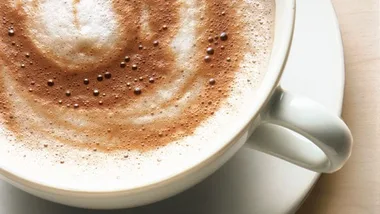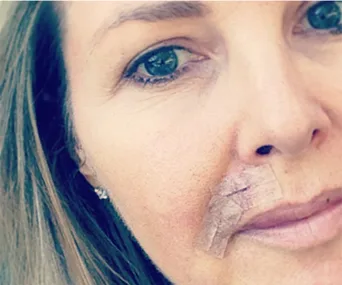The Cancer Council of Australia, however, vehemently disagrees, insisting commercial sunscreens are rigorously tested and safe, while DIY mixtures are “a risk that may show up in 30 years when you get skin cancer.”
“My prevention is that I eat well, I’m sensible about the sun and I don’t put anything on my skin except foods like coconut oil, inchi oil and cacao,” Cyndi tells aww.com.au.
She isn’t alone: other alternative health advocates are also promoting coconut oil, one of the trendiest “superfoods” on the market, as an alternative to sunscreen.
Cyndi says she’s concerned by nanoparticles in zinc-based clear sunscreens potentially penetrating underlying layers of skin and getting into the blood steam, plus chemical ingredients in other types that could interfere with the body’s hormone-regulating system.
But Professor Ian Olver, CEO of the Cancer Council of Australia, says there isn’t evidence that nanoparticles are harmful nor that any other sunscreen ingredients, particularly in the small doses they occur, pose any risk.
Claims of toxicity are “not accurate” and only serve to turn some people against sunscreen at a time when more than 2000 Australians die from skin cancer each year, he said.
“[The federal medicines regulator] is not going to let things into products that aren’t safe,” he says. “Trace elements are very good at blocking out UV light – that’s why they are there. And every batch of sunscreen gets tested to make sure it gives the protection that skin needs.”
“People used coconut oil to try and get a tan in my youth,” adds Prof Olver, who warned this would be particularly ill-advised as a replacement sunscreen for people with pale skin.
Cyndi says she builds up a tan and top up her vitamin D levels by getting regular sun in the mornings but minimising direct exposure in the middle of the day. “You don’t go out and be a sun goddess or a sun god on the weekend if you spend most of your week under neon lights,” she says.
In a blog, she recalls being accused by a fellow mother of child abuse for allowing her children’s skin to tan, plus sending a letter to their preschool asking carers not to apply commercial sunscreen to her kids.
Prof Olver disputed Cyndi’s claim that a tan was good protection from the sun.
“You don’t get a tan to protect yourself,” he says. “You need more UV radiation to burn darker skin but that’s talking about people who are born with darker skin. If you have a tan, you have about five per cent protective factor but you’ve put your skin at risk.
Cyndi, also an author and lifestyle coach, believes modern living, including unhealthy diets of processed and junk foods plus indoor lifestyles, is driving up skin cancer rates, rather than the sun.
She sells the ingredients for her homemade sunscreen, apart from zinc oxide, on her website. Prof Olver argues commercial sunscreen is affordable and are tested to prove their SPF levels.
“I don’t have advice for people; I just say this is what I do,” says Cyndi. “Don’t be a sheep – take a look for yourself.”



